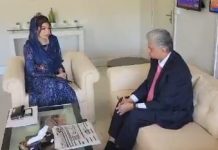
ISLAMABAD, Jan 22 (APP): Juan E Mendez, former United Nations special adviser on prevention of genocide, urged the international community to immediately intervene to protect the Indian Muslim minority from genocide threat looming largely after Hindu zealots and politicians openly called for arming themselves.
During an interview with Al Jazeera Tv on Friday, Mendez said there was a role that the international community had to spark sooner rather than later.
“The facts on the ground are serious enough that some expression of concern comes from the international forums like UN General Assembly, the UN Security Council (UNSC), and UN Human Rights Council,” he maintained responding to a query.
The first-ever UN adviser on prevention of genocide, said the UN General Assembly in 2005 had passed a convention to protect people from such acts of crime.
Juan E Mendez is the first United Nations Special Adviser on the Prevention of Genocide (2004-2007), appointed by then UN Secretary-General Kofi Annan.
He had also served as the president and commissioner of the Inter-American Commission on Human Rights and as the UN Special Rapporteur on torture. Currently, he is a professor of human rights law at the American University in Washington, DC.
Mendez had termed the situation in India, home to 200 million Muslims, “dangerous” and “deeply disturbing”.
About a question regarding the Indian government’s response, he said if response from the Modi’s government wasn’t appropriate then the UNSC should step in to protect Indian minorities and ‘a resolution under Chapter 7 is the way to go for it’.
It had a binding power and could include different things, one being the referral of the case to the ICC, he said, elaborating “I do think it is important for member states at the UN Security Council to start considering whether or not it should be advised to take actions in order to protect the minorities at risk in India.”
A large number of Hindu zealot religious leaders and politicians during a meeting in Haridwar last month, called on the Hindu community to arm themselves for genocide against the Muslim minority, which drew massive global reaction and denouncement by the rights groups.
During a congressional briefing in the United States, Professor Gregory Stanton, the founder of Genocide Watch, had warned that a “genocide could very well happen in India”.
“Whatever they (Hindu nationalists) have done so far should not lead anybody to any kind of complacency because, in fact, I do think the situation is dangerous,” he said.
The former UN Special Rapporteur on torture said the public policies of Modi’s government were discriminatory against minorities. These breaches were in a continuum between discrimination to hate speech to violence and eventually to genocide.
As a former adviser on the prevention of genocide, he said that he said that this sort of genocide calls and expressions are of international concern.
“The Genocide Convention of 1948 is about the prevention of genocide and it imposes on all states and nations the obligation that they have the power to do all that is required to prevent genocide from happening,” he added.
Mendez, to another question, further said the situation in India concerned him very much as there had been decades of hostility towards the minority communities.
“The calls for active violence are much more dangerous and part of the equation, and particularly in this context, it could lead to some people taking those calls seriously, acting on them, and provoking others, too,” he observed.
“After all, making calls for killing millions in any legal context is a crime, the crime of threats at the very least. And so, if there is no appropriate response to it by the government, then I think the international community needs to demand action to limit the possible effects of speech of that sort,” he added.
The former UN envoy referring to Genocide Watch’s warning said its opinion should be carefully considered. Stanton’s 10 Stages of Genocide was a highly respected way of anticipating and preventing genocidal crimes.
“The usefulness of this model is that it calls for attention to not only the fact that there are populations at risk – in this case, the Muslim minorities in India – but also to the actions that need to be taken for retardation of that situation,” he stressed.
He said that it was the responsibility, in fact, the duty of Indian Prime Minister Narendra Modi’s government to monitor the situation and respond appropriately to such calls for violence against any of the minorities especially against the population at risk and to deploy forms of protection for them.
“One of them obviously is to investigate, persecute and punish those who have committed crimes under Indian law. Not doing that constitutes violations of the Genocide Convention,” Mendez maintained.